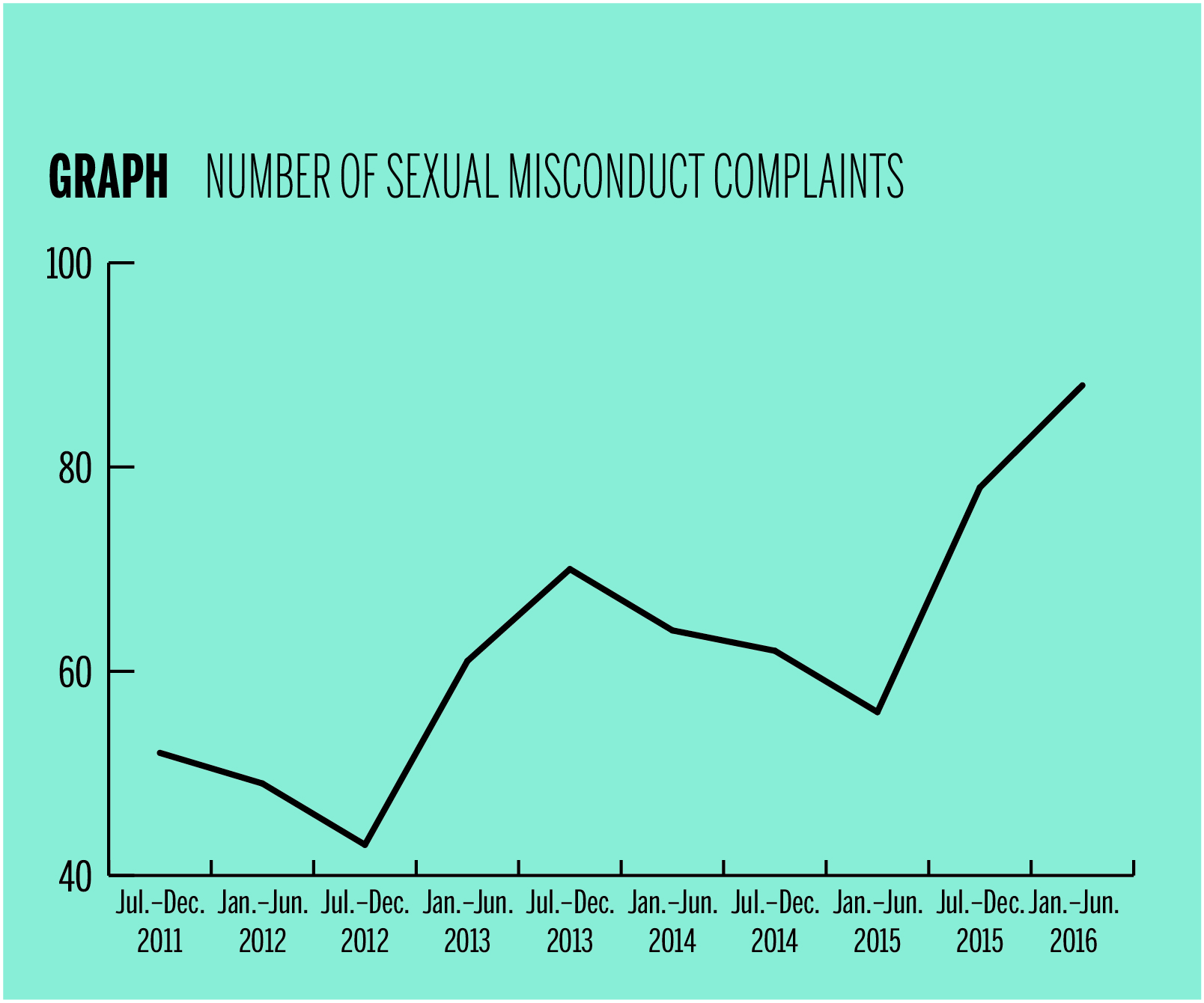
Last September, the release of the Association of American Universities report on sexual misconduct -— which said that Yale students experience sexual harassment or assault at rates greater than the national average — sent shock waves throughout the Yale community. One year after the report, administrators and student activists reflected upon the progress they have made and the work that remains.
According to the AAU survey, over half of Yale respondents have faced some form of sexual harassment since arriving on campus, and 16.1 percent said they had experienced attempted or completed sexual assault. These figures were even higher for certain demographics, such as undergraduates, women and those who identify outside the traditional gender binary. In a University-wide email, University President Peter Salovey said the results — which he called “extremely disturbing” — laid bare the need to “redouble our efforts” in combating sexual misconduct.
Since the release of the results, administrators across the University reviewed the data, discussed the implications in their individual communities and implemented policy changes. The resulting initiatives range from the creation of school-specific committees on sexual climate to the expansion of orientation and training programs.
“While the prevalence numbers in the AAU Survey are concerning, it has been gratifying and inspiring to see how the Yale community has used those results to fuel further action to prevent sexual misconduct and build a safe and respectful campus culture,” University Title IX Coordinator and Deputy Provost Stephanie Spangler wrote in an email to the News.
Programs and resources in place include bystander-intervention trainings and mandatory freshman workshops held by the Communication and Consent Educators, the Sexual Harassment and Assault Response & Education Center, as well as the University-Wide Committee on Sexual Misconduct.
Yale College Assistant Dean of Student Affairs Melanie Boyd, who directs the CCE program, said she has concentrated primarily on strengthening existing programs.
“For the Yale College community, which has been actively working on addressing sexual misconduct for several years now, the release of the AAU survey didn’t radically change our understanding of the problem,” Boyd said. “Instead, it added new urgency to programs already in place and expanded conversations already underway.”
In the wake of the report’s publication, the Office of Student Affairs and CCEs facilitated discussions and training sessions for students, faculty and administrators. New initiatives arose from those conversations, including the development of a weekend-long training program to discuss campus sexual norms, practice listening to victims of sexual violence and raise awareness of campus resources.
The survey’s findings also prompted the University to sharpen its focus on certain disproportionately affected demographics. Boyd said that her office “intensified” its existing work with the four cultural centers and the LGBTQ community. The data also led the CCE program to put greater emphasis on intimate-partner violence during its workshops.
The report revealed the need not just to update existing resources, but to make them more available, Boyd said.
“The AAU survey showed that while our students are exceptionally well-aware of campus resources, they do not take advantage of them as often as we would hope,” she said. “This has led us to put additional energies into making those resources more accessible.”
With that goal in mind, the University launched a new website, titled “Student Discrimination and Harassment Reporting & Response,” detailing the resources available to students who face sexual discrimination or harassment on campus.
Mobilization in response to the AAU survey results has gone beyond the administrative level to reach student activists. In October, Helen Price ’18 and Anthony D’Ambrosio ’18 established “Unite Against Sexual Assault Yale,” an advocacy group devoted to fostering a healthier sexual climate on campus. The group has since held a host of programs, workshops and events, including its campus-leaders program, which trained 40 student leaders to more effectively prevent and respond to sexual harassment and misconduct.
In response to the controversy surrounding the expulsion of former men’s basketball captain Jack Montague after he violated the University’s sexual misconduct policies, the group partnered with the Yale Black Women’s Coalition and the Women’s Center to organize a town-hall meeting and a “chalk-in” on Cross Campus, in support of survivors of sexual violence.
Last semester, USAY also administered workshops on “healthy masculinity, group behavioral dynamics and power dynamics in sexual situations” for the new members of every Yale fraternity. Price said fraternity members’ thoughtful participation was a promising sign.
“I think the goal of a lot of what we tried to do last semester was to start these conversations that no one was talking about and especially to start them in places where they didn’t traditionally happen,” D’Ambrosio said. “Now that we see tangible evidence that these conversations are happening, it’s a good first step for us.”
Additionally, Yale’s graduate and professional schools took steps to improve the sexual climate. The Yale School of Drama, for example, instated a new rehearsal protocol for scenes with sexual content, and the School of Management moved to adjust its orientation program and tasked a group with conducting a case study on the sexual environment at the school.
Clarification, Sept. 30: An earlier version of this article stated that former men’s basketball captain was allegedly expelled for violating University sexual misconduct policies. In fact, he was expelled for that reason.







